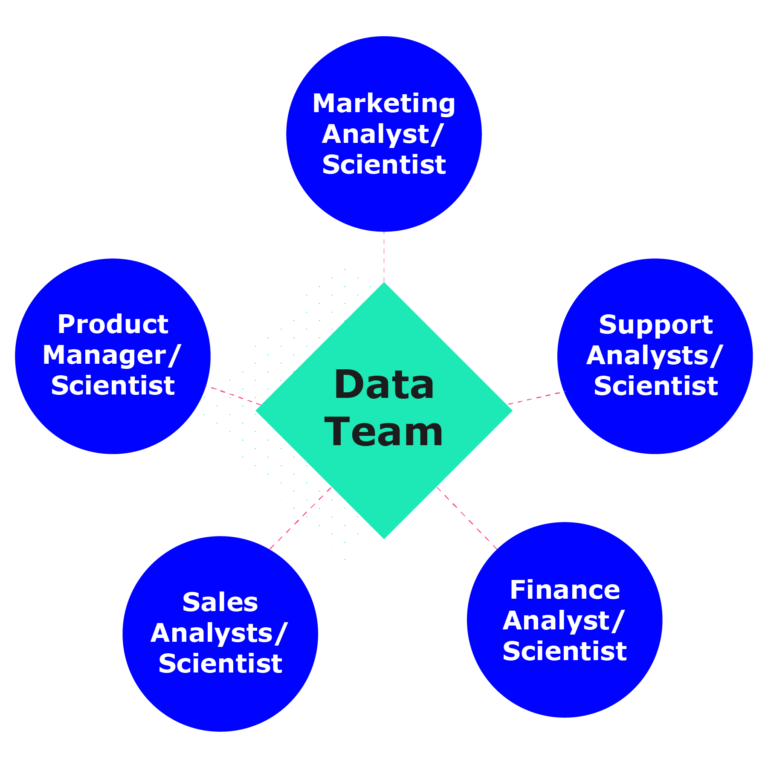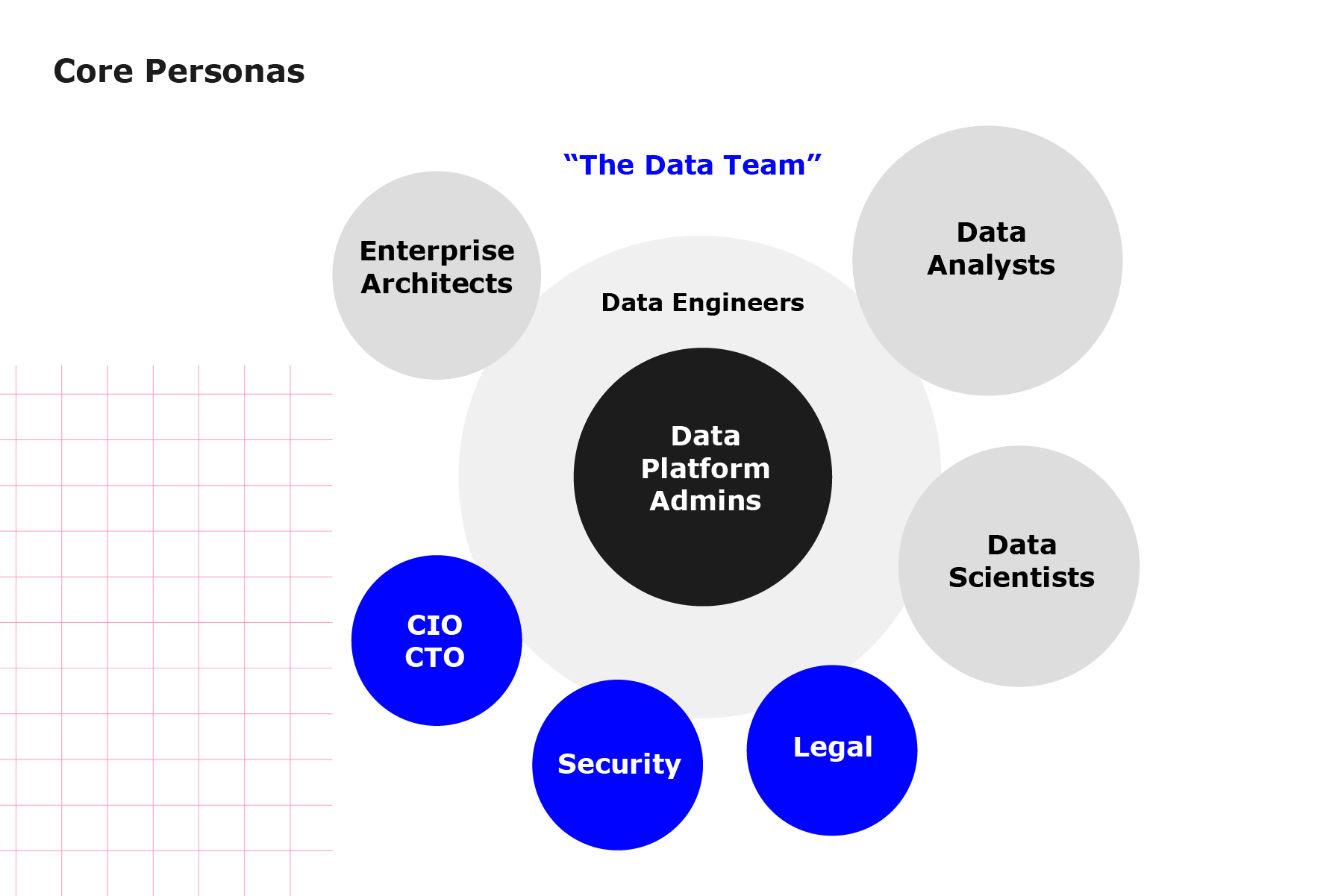Roles and Responsibilities in Data-Driven Organisations
The emergence of data-driven organisations has resulted in a new competitive landscape. Consider that, as per Forrester research [1], insight-driven businesses are growing at around 30% annually and are expected to earn $1.8 trillion by 2021. Successful businesses in the 21st century clearly have an analytical edge; they are data-driven, and generally possess two key characteristics.
- A culture where everyone buys into the idea of using data for better business decision-making.
- Technology that supports a data-driven culture and makes data self-service.
We can define a data-driven culture as an operating environment that aims to leverage data whenever and wherever possible, to enhance business effectiveness and efficiency. In order to create such an environment, businesses need to create and develop data teams and understand who the key role-players are that contribute to their organisation being data-driven.
The data team and key role-players
A strong, functional central data team is extremely important for creating connectivity across different departments of an analytics organisation. The data team is responsible for publishing important data sets that analysts embedded in various departments use to solve business problems.

Source: O’reilly [2]
The above diagram shows the data team and the surrounding embedded analysts, who have domain knowledge about the business function and understand datasets that can help them answer questions. In general, roles embedded in the data culture should be able to convert system knowledge into business knowledge.
Questions the embedded analysts would ask include:
- What is the market size?
- Who is our competition?
- What are the best opportunities today?
- Which geographic regions of my business are the best to invest in?
Roles and responsibilities in a data-driven organisation
The data team acts as the connective tissue, but what are they connecting to, exactly?
Let’s pull back and explore the organisational context. The following diagram indicates the core personas (ie persons in a job profile) that are part of any data-centric business.

Source: O’reilly [2]
Data analysts
These data professionals are a part of functional groups or business units. Their job is to convert business questions into data queries, so they are quite familiar with how the business operates, the strategic objectives, and how data fits in. Data analysts use data and communicate findings from their research to senior management for decision-making.
Data engineers
Data engineers are responsible for getting data onto platforms so that the data scientists and analysts can utilise them. They also capture data from different sources in the organisation, including information on end products, and they are responsible for publishing core data sets after cleaning and transforming such data. These data professionals usually sit within the IT function and could be dependent on application developers in order to capture the correct type of data.
Data scientists
These are members of the data team who manage statistics, deep learning, and machine learning. Machine learning in its simplest form is the use of statistics to find patterns in massive amounts of data. It powers many of the services that we use, such as Netflix, YouTube, Spotify, Twitter, Facebook, etc. Deep learning is a subset of machine learning; it’s an artificial intelligence function that imitates the function of processing data by the human brain and creates data patterns for use in decision-making.
Chief Data Officer
The Chief Data Officer oversees operations of the entire data team and reports directly to the CEO or the CTO.
Compliance and security teams
These professional teams ensure that compliance requirements are met through periodic audits.
Data platform administrators
These data professionals manage the data infrastructure, which includes data warehouses other and forms of digital infrastructure. Data platform administrators ensure the infrastructure functions well, that there is enough capacity, and they use the infrastructure to provide adequate quality services to the different teams.
Line-of-business users
These users use data for business decision-making purposes. Provided with reports, ad hoc analysis tools, and so on, they act on the analysis they are given.
Data-driven culture
As noted earlier, a data-driven culture is an operating environment that aims to leverage data whenever and wherever possible to enhance business effectiveness and efficiency. However, if there is no executive buy-in and support for creating and sustaining a data-driven culture, such an operating environment will not emerge.
What can executives do to lead by example here? Let’s consider some of the ways C-suite personnel can act in order to bring about an analytics culture on their watch.
Decisions
Executives could send out a clear message that data matters and that data analytics should be used to monitor performance and make business decisions.
When executives base their decisions on data, they reinforce data’s role as an important strategic asset that serves as an integral part of the decision-making process. Moreover, executives can hold their direct reports accountable to use data analytics in business decision-making. (While some leaders may resist logging into advanced analytic tools, they could benefit from dashboards that are accessible via mobile phones.)
Communications
Business presentations, e-mails and other forms of communication present an opportunity to share insights on business performance, promote data-driven wins, and emphasise the importance of data to the organisation.
Meetings
To make business meetings more productive, key metrics and performance measurements along with action plans to address key business problems can form part of the meeting agenda. This ensures executives meetings are more productive and focussed.
Training
Upskilling is an important part of any organisational culture. By signing onto data-based training, executives can send a powerful message to their team and signal just how important such data analytic skills are to a team’s success.
Digital displays
Digital displays installed in public locations drive the key message that data analytics and associated key performance indicators matter.
A data-driven culture encourages continuous experimentation with new methods, tools, and approaches to studying and influencing workforce behaviour. Such encouragement stems from executive buy-in revealed in a commitment to analytical maturity over time.
However, according to Bersin’s High Impact People Analytics research [3], only 2% of companies have reached the highest level of people analytics maturity. Moreover, organisations that have reached such maturity are three times more likely to have a data-driven culture and enjoy significantly higher revenue (96%), cash flow (88%), and profit margins (82%).
References
[1] Chapter 4. Building a Data-Driven Organization [Document]. O’reilly; 2020. Available from: https://www.oreilly.com/library/view/creating-a-data-driven/9781492049227/ch04.html High-Impact People Analytics study [Document]. Bersin, 2017.
[2] Building data-driven culture: An interview with ShopRunner CEO Sam Yagan [Internet].
[3] McKinsey & Company; 2019 Feb 14. Available from: https://www.mckinsey.com/business-functions/mckinsey-analytics/our-insights/building-an-innovative-data-driven-culture-an-interview-with-shoprunner-ceo-sam-yagan
Share this
Financial Analysis for Business Performance: Data-Driven Decision Making

Financial Analysis for Business Performance: Data-Driven Decision Making


Reach your personal and professional goals
Unlock access to hundreds of expert online courses and degrees from top universities and educators to gain accredited qualifications and professional CV-building certificates.
Join over 18 million learners to launch, switch or build upon your career, all at your own pace, across a wide range of topic areas.
Register to receive updates
-
Create an account to receive our newsletter, course recommendations and promotions.
Register for free







